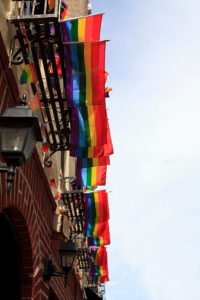Breaking into Pride

By Joyce Perfetti, DO
Assistant Medical Director, USACS South
At US Acute Care Solutions, we know that when people of different experiences and backgrounds come to the table, it leads to making better decisions. We value diversity of age, gender, race, ethnicity, religion, sexual orientation, family status and life experiences.
Incorporating diversity and inclusion into the workforce and workplace is initiated and led by our active Diversity and Inclusion Council here at USACS. To fully understand the complex issues at the bedside, we need to have people working in our hospitals who reflect the individuals in the communities we serve.
Breaking into Pride
Pride Month is often recognized as rainbows, parades, and celebration. Despite its colorful connotation, Pride was born from a dark time in LGBTQ history, and bears remembrance as we honor it this June.
Origins
The origins of Pride month is a commemoration of the Stonewall uprising of June 1969. Until 1966, serving alcohol to a gay person was illegal, and in 1969 homosexuality itself was illegal in New York.[1] These restrictions often led to police raids of establishments catering to the LGBTQ community, including the interrogation and raid of a popular gay bar in NYC, the Stonewall Inn. In the early hours of June 28, 1969, a police raid forcibly “outted” (both literally and figuratively) many gay patrons to the New York streets. This discrimination was common not just in NY, but throughout the United States; however this event led to a six-day protest against arrest and harassment of the Stonewall patrons. Thousands of protestors within and in support of the LGBTQ community protested together, leading to a huge turning point for gay and transgender rights and activism.[2]
Pride Month Today
As time passed, smaller gatherings and parades grew larger and more commercialized. This has led to the large commemoration of the LGBTQ social movement we know as Pride Month today. Despite hostile origins, Pride has evolved to become a celebration of the gay community and its supporters. Also, it is a time to reflect on the advances made in the past year. Finally, it is a time to consider challenges still ahead to reach true equality.
The easily-recognizable symbol of Pride, the rainbow flag, was designed and chosen in honor of its representation of the diversity of this community. Over the years many variations of the flag has been made, including adding a black stripe to represent those lost to the HIV/AIDs epidemic. However, regardless of the version seen, the message of the rainbow flag is a clear one of diversity and acceptance.
Marching On
This June, while we are in the presence of rainbows and celebration, remember the discrimination faced by the LGBTQ community, both in the past and present. Whether you are a part of the LGBTQ community or a supporter, find a way to show your inclusivity to our friends, family, colleagues and patients.
Ideas include:
- Support a business owned by people who identify as LGBTQ
- Learn about sexual orientation biases
- Educate yourself more about unique transexual issues in medicine
- Simply sport a rainbow.
After all, everything is better with love, and love is always better in color.
Understanding the medical needs & healthcare obstacles facing LGBTQ community
From the USACS Diversity & Inclusion Council
If you would like to jump-start your knowledge base on the medical needs and healthcare obstacles facing the LGBTQ community, there is a free webinar series available to healthcare practitioners from the Gay and Lesbian Medical Association (GLMA). You may access this under the Resources tab on www.glma.org
Footnotes:
[1] Library of Congress (2020) The Stonewall Uprising of 1969. https://www.loc.gov/item/today-in-history/june-28/
[1] Thompson, Brian (2020) The History of Pride Month and What It Can Teach Us About Moving Forward Today. https://www.forbes.com

